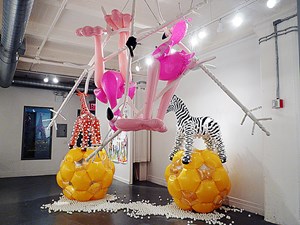
"I think that art has not such a social role that contemporary society would like us to believe. Especially when it is used as a substitute to real politic or education to try to badly fix a certain lack of social cohesion, economical fragility or cultural poverty. At this level, society's expectations of the unifying and restorative potential of art (and artists) are totally disproportionate".
Image: Neo Paradise - Giacobetti-Paul Gallery - NYC - 2014
Born in 1966 in France.
1988-1989/1994 art studies in Villa Saint-Clair in Sète then 5 years in Villa Arson in Nice. 2001/2004 Conservatoire de Marseille section Electroacoustique.
"I made a lot of videos and installations in my artist life, using everyday objects or situation in order to transform reality into something more magic or fantastic. In 2006 I made a 80mn documentary about Los Angeles where I spent a lot of time. It’s called : « Voilà les Anges ».
I did also a lot of collages, numeric compositions or paintings, with computer or acrylic on canvas. I call that « universe » that I try to structure : tragic-fun. I showed my work in France, Europe, Persia, Japan, US.
My artistic practice also goes from writing to « Low-Couture » to experimental electronic music. For me, life is just an excuse to create".
ArtDependence Magazine (AD): Do you have any thoughts on whether that’s a responsibility of artists, reflecting our time is important within the political context?
Denis Brun (DB): This society permitted me to be what I am so I must give back something around to explain how it worked for me.
Even if I hate politic and politicians, my response to that fact is to try to show hope through my everyday life and work.
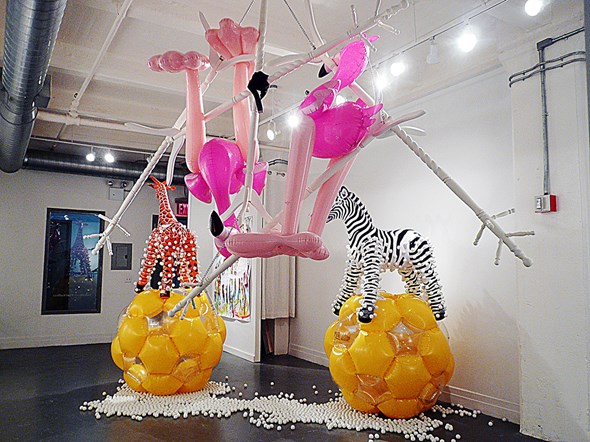
Neo Paradise - Giacobetti-Paul Gallery - NYC - 2014
Modestly I have the impression, with passing time, that my artist life can be an example of « living your own dream in a chaotic context ». I talk about it with people I meet, through workshops, exhibitions or different meetings in everyday life, even when I use a "car-sharing" to travel around…
So, it’s political to explain to people how I became artist and why I keep doing it even if it looks hard or crazy.
The main message is : creative adaptation in your way of thinking and relation with life.
Because I’m happy as an artist, and human being and citizen, it’s my social and political responsibility, when I’m asked, to show and explain how I live, how I work and how I became an artist.
I consider my social position, even if it’s modest, as a chance, so I have to show to people how I deal with reality to be happy and creative.
I try as often as I can to explain how it’s important to follow your dreams even if it sounded impossible at the beginning.
AD: What is your main interest as artist? What form of self-consciousness is applicable to the art-making?
DB: As an artist, my main interest is the relation with freedom in my work.
Freedom of using any material, any medium, any idea, anyhow, with no censorship.
It’s a real serious way of thinking and working. And it’s the only way for me to continue creating, because the freedom I build opens new doors and windows in my creativity landscape therefore I can evolve and grow up.
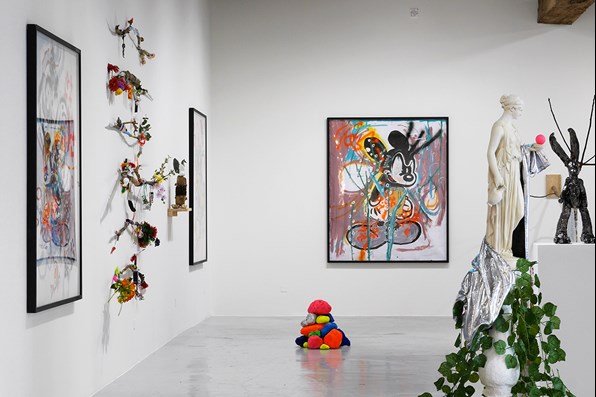
How Creep Is Your Love - Vidéochroniques - Marseille - 2018
I don’t know if there any self-consciousness applicable to the art-making but I rather think that there is a self-consciousness resulting from the art-making. When you get it, you reinject it to your creation process.
AD: Do you feel that it’s important to convey your own beliefs and opinions within your art? Is there a philosophical element in your work?
DB: Well I don’t really think about it when I create otherwise I’d be a politician and manipulator… But I’m really happy when people feel something inspiring when they ear or see my work.
I’d like to believe that the quest of freedom could be the philosophical backbone of my work.
AD: What are you currently working on? Is there anything in particular that you’d like to get across through your work?
DB: I’m actually working on photography, rather black and white, through Instagram. I really use Instagram to show photograph and to work on this medium. It’s also a kind of diary for me. I spent 8 days in Rome after Xmas and one month after, I’m still working on the pictures I took there. I publish from 5 to 10 pictures a day. I took a lot of pictures.
I’m also working on a new solo show in Montpellier, and try to publish an new monographic catalogue.
If I could, I’d like to show that anybody can find some enchantment in life. If you look well, with attention, you can see magic and poetry almost everywhere, even in melancholy.
AD: What place does creativity have in education ? Do you view yourself as a creator?
DB: Creativity is very important in education because it’s a ladder that leads you to levels of perception where your global intelligence can grow-up faster. Creativity also permits you to optimize interaction between your intellectual abilities and the rest of the world (people/situations).
Creativity is both a parachute and/or a playground for your intellectual fonctions.
I definitely see myself as a creator, even more than as an artist or visual artist.
AD: Do you think that by challenging conventional views, art can truly make a change in the public’s perception?
DB: Individually yes. If a person has a strong emotion through art, it really can change her life.
Art can give people keys to their own perception, at several levels.
If you’re just opened enough or maybe on your way to change something relevant in your life, it can happens that art help you in that direction.
Art is not a weapon, it’s a multifunctional tool, and when the artist has finished his work, the tools are still around the work, all the time. Just open your eyes and you’ll find them.
Sometimes the tools are even more interesting than the work itself, and of course, some artists are also really very good in hiding their tools.
But for sure you can’t mesure in advance the impact of any kind of art piece on the public’s perception.
Otherwise it would mean that we are in a dictatorship whose behavioral codes are fully manipulated for purposes of obedience and consumption, by its leaders whatever they are.
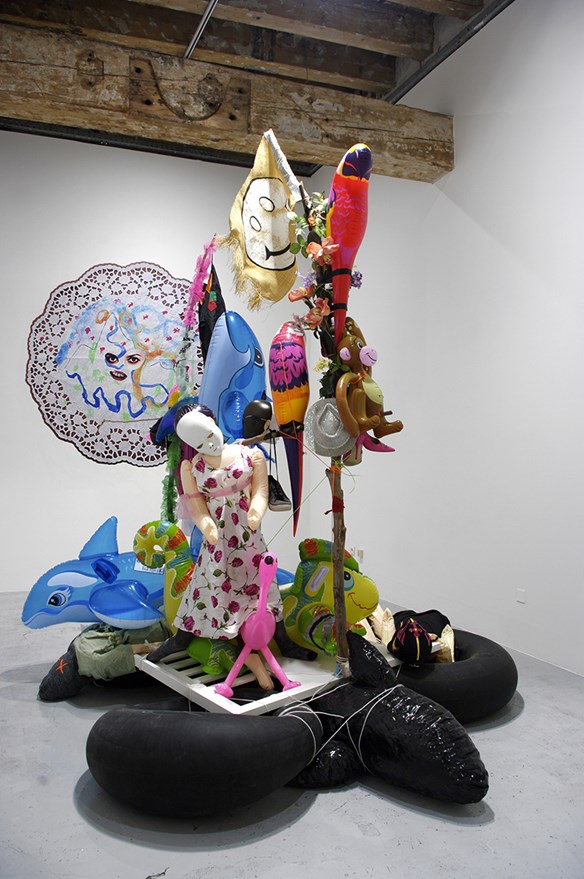
How Creep Is Your Love - Vidéochroniques - Marseille - 2018
AD: How has your work developed since you began and how do you see it evolving in the future?
DB: My art first grew up inside me then outside me. At the beginning I only drained my memories and primal emotions inside me to feed my creation. With time I learned how to use the outside world, the travels and the meetings with other people, in a way to interact with my inspiration and fertilize my work.
In my early 30’s I started to produce hand sewed dresses, all different but all built from the same pattern.
I called that work : Basse Couture (Low Couture).
In parallel, I started to make a lot of electronic /experimental music under the name of Toshiro Bishoko and I spent 3 years at the Conservatory of Marseille in the Electroacoustic class.
Since 2012 I became curator and organized around 20 exhibitions with a lot of foreign artists.
I will produce 2 last exhibitions in the next 2 years.
I see the evolution of my work still connected with real basic life (work in my studio, boredom, travels, people, situations, food, music, etc) and technology (internet, electronic music softwares, graphic softwares, online production, etc).
But the most important thing that I have to stay with is the discipline of work and healthy living (with the possibility of controlled skidding).
AD: Is sophistication, aesthetic accomplishment in the eye of the beholder?
DB: For some beholders yes, of course. They can even find subtlety in your work where you’d never bet there was any of it.
Culture also helps a lot to appreciate art, especially because it can defuse the time bomb that represents the fear of not understanding a work of art.
But some very uncultured persons can also have very cutting edge perceptions of a creation, because of their intelligence and sensitivity. Curiosity may be the ultimate highway to to abord art, but to be sincere I guess that, I can’t really answer to that question without saying big mistakes…
AD: What do you think is the social role of art? How would you like to be remembered?
DB: I think that art has not such a social role that contemporary society would like us to believe. Especially when it is used as a substitute to real politic or education to try to badly fix a certain lack of social cohesion, economical fragility or cultural poverty. At this level, society's expectations of the unifying and restorative potential of art (and artists) are totally disproportionate. From my experience and point of view, saying that art has a social role, means that art is just another trick to soften people and finally help them to get into boxes that they initially refused or avoided.
Art must help people to flourish within themselves, long before they flourish in society.
In another side, if you take caring people who disseminate and explain art for purely humanistic or even utopian purposes, it can indeed have very good effect on people because pure creation has no negative side effects, never.
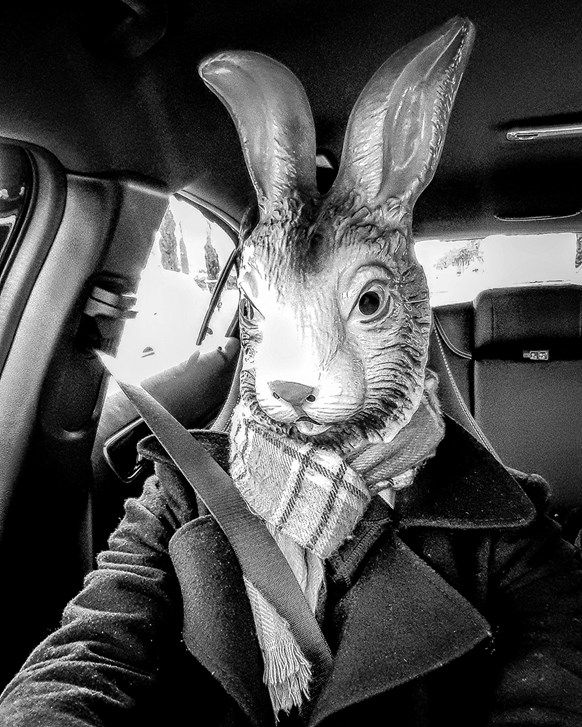
The Ballad Of Donnie Brown - Numeric Photography - Variable Dimensions - 2018
But I think that this kind of situation or experience can only be done in an exceptional, isolated or accidental way, with a limited number of individuals.
In no case this process can it be instrumentalised, machined and reproduced, or else we talk about art schools and so we talk about another subject that is to learn a trade, not necessarily to make or being connected to pure creation.
I’d like to be remembered as a flourished, happy and free artist.
AD: How does art school form ideas about art? Does it shape people into being certain types of artists?
DB: Art school gives you keys to understand art history, art world in it’s general theoretical sides.
You also have teachers for several disciplines, so basically during 5 or 6 years, you will be confronted with lots of informations, critics, while learning various artistic or para-artistic techniques.
That is the starting point and keystone of your artistic and intellectual baggage, more or less.
During that time you’ll choose directions in your work, and you’ll also focus on recognized or older artists to have some vanishing points or intellectual and career perspectives.
Basically, after your parents (if you have the chance to have ones) and general common school,it’s the second strong and deep educational level time of your life. But that one, you've chose it, so, it’ll stay in your mind forever.
Yes, art schools form ideas about art, and shape people, like any parents and any school change the children, and because anybody would be changed or oriented in a 5 years process of learning.
Especially if your sensitivity and subjectivity are regularly confronted to other sensitivities and subjectivities.
They are put to the test in the midst of a large-scale educational process that shall help you get strong and structured, hoping to walk and survive after the last exam before real life.
And the real life starts after the final exam, so that’s also the moment when you’ll have to digest, like with any other education, what you have learned. With time your practice will be more personal and one day you’ll create your own artistic grammar and vocabulary.
You can choose a model of art life when you are student and follow it your whole life. You can choose a certain artistic direction because your school helped and putted you on that track during the last year.
You can be noticed by a gallery during your last year and starting from there to build your career...
All is a question of choices, strength, intelligence... and chance...
AD: What do you think about the art world and art market? Do you accept that art is inherently an elitist activity?
DB: Art world and art market are 2 different things, both very huge and complex.
I can only talk about what I live everyday, that means working regularly on different projects, meeting other artists and gallerists in Marseille, ore elsewhere, during openings or diners… above that, there are many other levels of the art world that I only see as a spectator so what can I say…
I think it’s just another professional world related to social status, to profit and a little bit to culture, with its habits and customs.
Same thing for the art market that I know and practice.
I have bunch of modest collectors, some of them became my friends. They buy me works some time to time, but they also buy other artists’ works.
So, I can’t really count on them to live on my art.
If I’d be in a international high level gallery I would probably have another opinion and vision of the market but at my level, I don’t really interest investors yet so I don’t have to focus too much on « mass production » or « derivative products »
Because I come from a modest background I guess that I had to work on accepting the fact that art is somehow an elitist activity, although I don’t really agree with the often underlying and pejorative meaning of «elitist».
I think it’s useless to consider art under that angle, especially nowadays in our global political context.
It’s so complex and so hard sometimes to create and to make art… if you associate negatively to it the « elitist » label , it's to me, rather a way to scorn a big part of art and artists.
Once again, "elitism" is not an insult to me, just like excellence, nobility or particularity.
And so, I’m not really sure if working everyday in your studio, night and day in your mind, sacrificing a lot of material confort and pleasures to produce ideas, objects, concepts or exhibitions that nobody will buy or see, can really be associated to an elitist activity.
I just think that somehow, you have to be exceptional, in anyway or another, to be and to stay an artist - preferably not too crap - all your life.
And in the end, what is particularly elitist in art, as in any other activity for that matter, it is success.
AD: What’s the last great book you read? Any other thoughts/projects to share?
DB: The last great books you mean? Sorry it’s in French : «La veuve Basquiat» Jennifer Clement - «Manchester Music City» John Robb - «Bandistsky!» Andreï Constantinov - «Lucie dans le ciel» Tom Verdier.
Few weeks ago I tried to play with an electric bass-guitar and I loved it.
So I’ll maybe buy a second-hand one to use it in a new Toshiro Bishoko album.
I seriously started to write novels since December 2018.

ArtDependence Magazine is an international magazine covering all spheres of contemporary art, as well as modern and classical art.
ArtDependence features the latest art news, highlighting interviews with today’s most influential artists, galleries, curators, collectors, fair directors and individuals at the axis of the arts.
The magazine also covers series of articles and reviews on critical art events, new publications and other foremost happenings in the art world.
If you would like to submit events or editorial content to ArtDependence Magazine, please feel free to reach the magazine via the contact page.